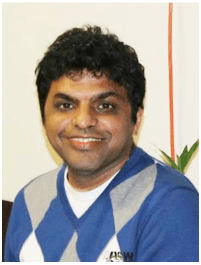- May 20, 2021
- By Aadit Tambe M. Jour ’22
When it rains, it pours data in Manik Bali’s job monitoring weather satellites for more than 15 space agencies worldwide.
Bali M.P.S. ’21, a senior faculty specialist at UMD’s Earth System Science Interdisciplinary Center and deputy director of the Global Space-based Inter-Calibration System for the National Oceanic and Atmospheric Administration, knew he needed a better way to analyze the information constantly streaming from the satellites. He had a hunch that recent advances in the branch of artificial intelligence known as machine learning would offer a better way to cope with the deluge, while helping to collaborate with global partners. But how could he gain this highly specialized knowledge while working a full-time job?
The answer was the new UMD Science Academy master of professional studies program, which is graduating its first cohort, including Bali, at the university’s commencement ceremonies on Friday. The program has broadened his world—literally—in his job, he said.
“I’ve been able to deepen my collaboration with the scientific development techniques that I’ve learned,” he said. “Now, when I perform data analysis, I use platforms such as Google Colab and invite all my partners across the world to participate.”
Launched by the College of Computer, Mathematical, and Natural Sciences in Fall 2019, the Science Academy aims to make graduate education accessible to a larger audience—mainly working professionals looking for a practical educational experience beyond a traditional bachelor’s or master’s degree. It debuted with two programs—a Master of Professional Studies in Data Science and Analytics and a Master of Professional Studies in Machine Learning.
“The Science Academy is really about identifying where the needs are in the marketplace when it comes to science education, career development and professional learning,” said Amy Chester '05, M.A. '11, director of the Science Academy. “We want students to be agile in order to fill those needs in the marketplace.”
Students, numbering over 40 in the Spring 2021 semester, can attend classes in the evenings, and unlike a traditional master’s degree, the M.P.S. programs don’t have a research component, but instead focus on training students with the skills they need to work in a professional setting. After the pandemic hit, instruction moved online.
Creating these graduate programs, Chester said, was an opportunity for faculty from different disciplines—such as linguistics, mathematics, computer science and engineering—to come together to craft an approach. Courses for the two programs are expected to go back in person in the fall.
“Our students can get a really nice mix of both—hearing from the experts in research but then also those working in the industry—to learn about what the job looks like on the ground,” she said. “Students are able to network and broaden their academic and professional portfolios when they’re coming out of our programs.”
The global data science market, which was valued at $31.05 billion in 2019, is expected to reach $230.8 billion in 2025. Corporations across industries are interested in graduates who can understand big data architecture and have the knowledge to create models and algorithms that learn from—and make decisions or predictions based on—data science, Chester said.
Bali, who took advantage of the tuition remission offered through his employment at UMD, said one of the most enticing aspects of the program was the ability to attend classes after work.
Through the Science Academy, he learned collaborative ways of creating algorithms—such as cloud computing for data analysis—that allow him to participate in research conducted by other weather agencies in the world.
“It added immense value to the way I look at data science and build algorithms,” he said, adding that for the first time, he’s able to invite international partners to participate in data analysis done on the fly over the internet. “I’m able to collaborate much better than before in my work."
